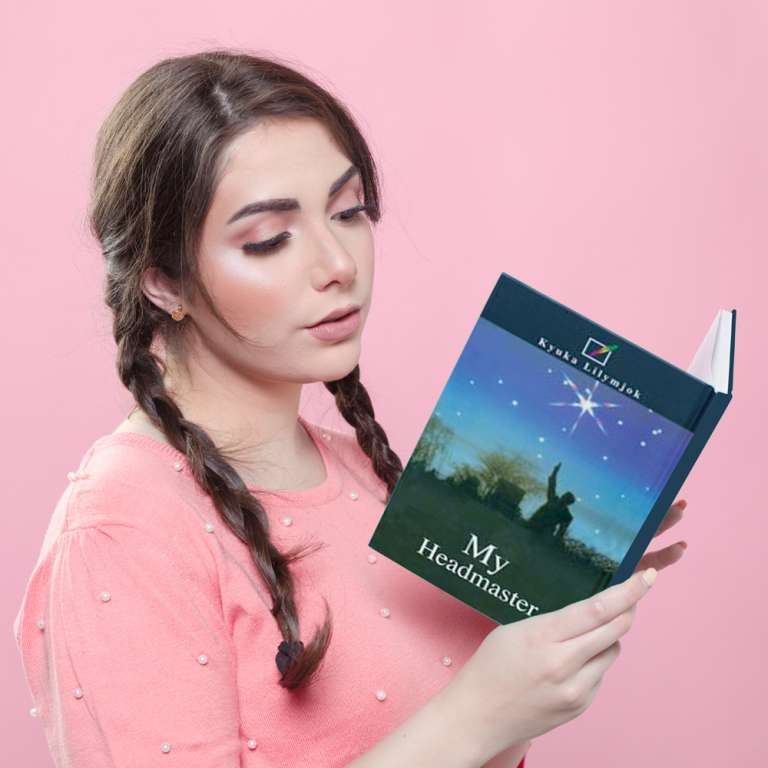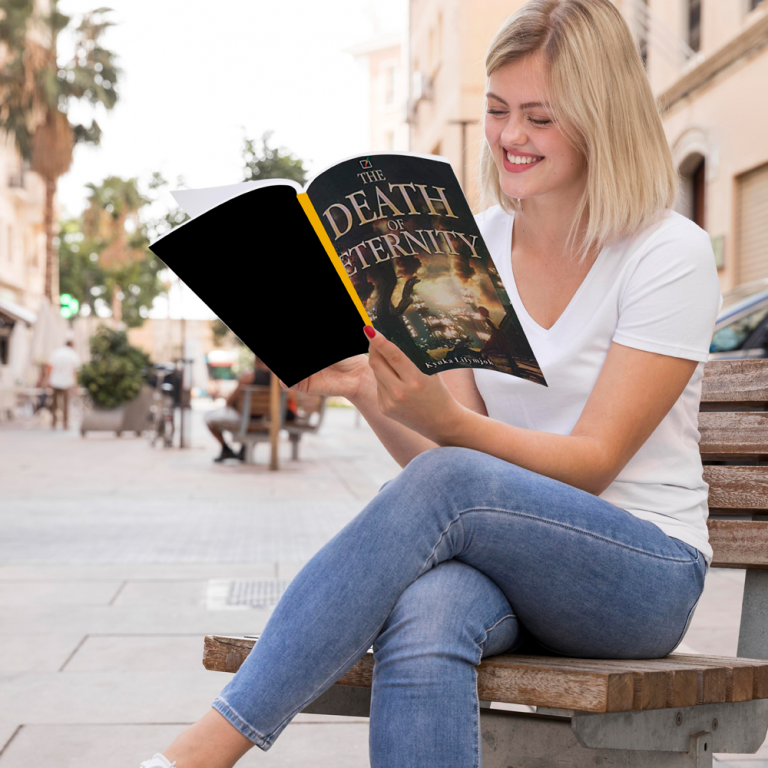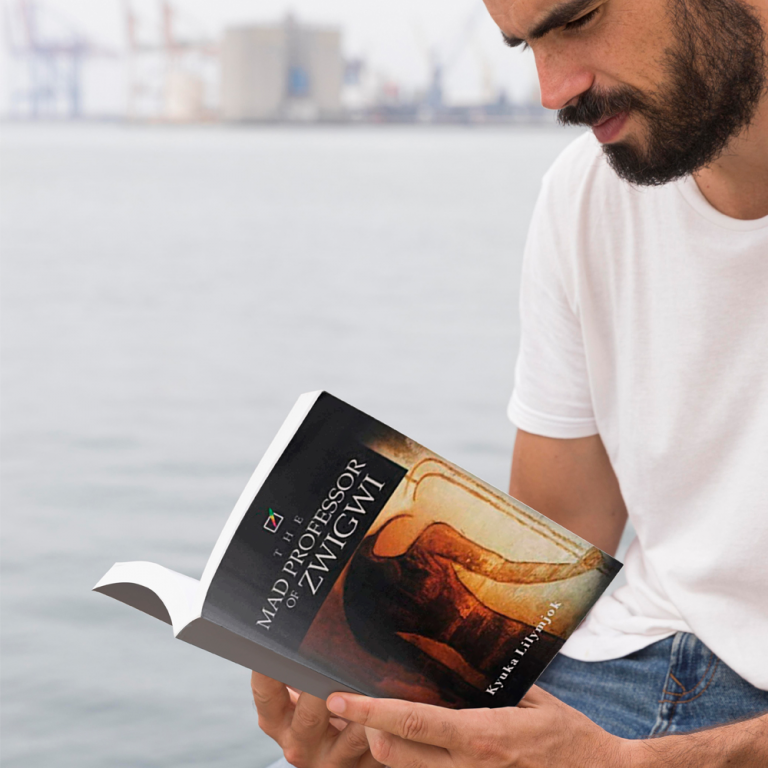Who is Kyuka Lilymjok, sir?
I am an every day man on the street with very strong views on important issues of life like politics, religion, race, science and technology, justice, peace et cetera. Up to 2014, my name has been Adamu Kyuka Usman. But from that year, I started using the name Kyuka Lilymjok, particularly in my literary writings. Finding myself African, I wish to be authentically so, hence my preference for Kyuka Lilymjok especially in my literary works. In this name lies my genius and essence.
- I notice you are a lawyer by profession; could you tell us what prompted you to go into literary writing?
Interest I suppose; and as it is popularly assumed that interest is a revelation of talent, talent perhaps. Right from childhood I have been a story teller and fiction writing is story telling.
- What are the books you have written so far?
29 fictional books and 4 law texts: Hope in Anarchy, The Village Tradesman, The Butcher’s Wife, The Lord Mammon, My Headmaster, Bivan’s House, Sieged, The Death of Eternity, The Lone Piper and the Birds’ Case, The Heart of Jacob, The Disappointed Three, The Mad Professor of Zwigwi, A Journey of Hell to Heaven, Farewell to Peace, Gods of my Fathers, Twilight for a Vulture, The World Conference in Heaven,The Deportee, The Old Woman and the Birds, The Wind Scripts, Tales of Tartarus, Return of the Oracle and other Short Stories, The Dark Star North, Our Lady with the Sword, Slates and Bowls, Ebelebe, The Fall of Heaven, Broke, Stupid, The Law and Practice of Equity and Trust, Environmental Protection Law and Practice, Nigerian oil and Gas Industry: Institutions, Issues, Law and Policy, The The Theory and Practice of International Economic Law.
- Has writing literary books detracted you from the law area?
Not much. That I am a professor of law is fairly proof of my presence in law.
- What type of satisfaction have you derived from engaging in literary writings?
Living my dream. Literary writing is my dream – a sweet dream I am always depressed to wake from. Nothing excites me like using common words in an uncommon context. In literary writing, I always want to locate myself at the margin of words. For me, every sentence must be well plotted and well executed. For me, every sentence must carry a magnet that holds the interest of the reader to the next. Another satisfaction I have gotten from literary writing is that it has helped me put my time to good use. If I have a sense that I have not wasted my life, that sense comes from seeing my books. Most of the time I have spent in life, I have collected in my books. Naturally I am not a man given much to association with others. I don’t have many friends. I am not a man of ceremonies. Even as a young man I attended wedding and marriage ceremonies only when it was absolutely necessary. So I often find time at my disposal. When I returned to Nigeria in 2015 without my family after my brief sojourn in Canada, I found more time at my disposal. Literary writing takes this time. It keeps me away from mischief. You know they say the idle mind is the devil’s workshop. My mind is never idle. So the devil has no workshop in me.
- In almost all your books, there is a deliberate and definite empathy you display for the downtrodden. As a member of the elite class most of whom want to hold onto their privileges as exclusive rights how do you explain your peculiar stance?
I think , as a person, I am passionate about justice. That is perhaps why I read law. That is perhaps why justice features in all the names of my children. The name of my first son is actually Justice. The name of the second is Sunfair i.e someone who will be as fair as the sun to everyone. The name of my only daughter is Fairprincess. I believe that justice is everyone’s birthright, if peace is not. Yeah, I read law thinking it is the handmaid of justice. But as I mature in legal jurisprudence, it dawned on me that law is not fundamentally different from politics; it dawned on me that law is an instrument of injustice. Every day, everywhere, the poor and so-called ignorant people are cheated and trampled upon, are served raw deals that will itch even the throat of a pig – with the law looking on, sometimes even strengthening the hand of the oppressor. This pains and riles me. This moves my pen to denouncement.
- What do you think are the pragmatic remedies that could be adopted to address the plethora of social problems currently ravaging African societies like your fictional Bivan’s House or Sieged and your other writings?
Africans are nothing because they are nothing. They are nothing because what make a people , a plant, an animal something is suppressed in them. What makes a people , a plant, an animal something is genius – the guardian spirit delivered of genes. For Africans to amount to anything, worthwhile, they must first of all be themselves and stop aping others. Like wolves, they should express their genius, not frustrate or suppress it like dogs. Africans will rather be anything but Africans. They are either Arabs, Jews, Europeans or Americans. This struggle to be someone different from who they are, stifles the African genius and thus the African intellectual tree cannot bear fruits. With a suppressed genius, the African cannot invent, cannot innovate, cannot even produce. This is the thesis I pursued in my novella Gods of my Fathers. We are not ourselves. We are fakes and fades and as such, are neither here nor there. The struggle to be European, Arab, Jew, American creates an inferiority complex in the African that leads to a depleted sense of self-worth. This drives him to corruption to acquire gadgets and attires of refinements he associates with those he wants to be like. It is this negative psychology that leads to tragedies as those parodied in Bivan’s House and Sieged.
- There is definitely a very rural and rustic flavour in your works, how has this come about?
This comes about because I am myself essentially rural and rustic. I was born and bred in the village. Back in my village, I have trees that are my age mates, I have trees that are my friends – trees I don’t visit the village without going to sit amongst. The bucolic elements in me are indeed the demons that drive my writing. As a literary writer, I am nothing without my village. In my cerebral novel The Mad Professor of Zwigwi, there is a chapter I titled: My Village, My Life. In this chapter, I made the point that I can compass the whole world from the dewdrops of my village.
- In Bivan’s House you boldly portray the character Umaru on one hand and some Christian youths as violent religious fundamentalists. In an essay titled “Religious Violence and its Consequences…”, Maria Ajima points out that writers are yet to give us a peep into the real heart of the character of a religious fanatic(s) so to speak. This is because we need to know the motivating factor behind such evil minds and until such persons are understood, society cannot begin to redress religious violence in its midst. One wonders whether in your subsequent writings, you can take the challenge of unveiling the real minds behind the evil of religious violence and how their minds work. I am talking here of something similar to what former USSR’s renowned writer Fyodor Dostoyevsky in Crime and Punishment did.
Fanaticism arises from how fanatics understand God and what God expects of them. Whenever a believer understands God as a being he should not tolerate any behavior that seems like an afront to, he is likely to be a violent fanatic.
- Your writings are largely satirical, why?
A good portion of my novels dwells on politics and government. There is a lot of folly in politics and government that needs to be ridiculed. Sarcasm and ironies are the tools of doing so. I like writing on serious issues in a comic way may be because this is the type of writing I enjoy reading. I like spiting both gravity and humor from my pen. With gravity I censure; with humor I soothe. With gravity I torch; with humor I quench. If I can, I like people to cry and laugh at the same time when reading my book.
- In the third world environment where life is more of a struggle to exist than anything else, how do you find time to relax and how do you relax if ever?
I hardly have such time. But when I do, I drive out into the country and take a walk in the woods.
- Who are your favourite authors?
Chinua Achebe, George Orwell, Thomas Hardy, and the peerless and immortal Shakespeare
- Which genre of literature do you love reading? Poetry, drama or prose?
Prose
- Which book(s) are you currently reading?
None largely because good books are hard to come by these days in Nigeria.
- Who are your favourite Nigerian authors and why?
Chinua Achebe. He tells a story in the most natural and realistic form. His novels are so real that they look like Igbo history. So real, his works find constant reference in real life situations.
- Which poem have you read that lingers in your mind?
Kofi Awoonor’s Songs of Sorrow, JP Clark’s Night Rain and Abiku.
- Which characters have you come across in your reading that you cannot forget and why?
Benjamin the donkey in George Orwell’s Animals Farm; Nwaka the Owner of Words in Achebe’s Arrow of God and Josiah the Trader in Achebe’s A Man of the People. Cynical, proud and self-seeking, these characters are ever-green in my mind.
- Which of your books do you like best?
All. All because I find all my books interesting. I find them all interesting because I give every book of mine my best. In 2017, someone badged into my office and was surprised to find me crying. He was alarmed. He thought I was bereaved or some other terrible thing has happened to me. I told him none of these has happened. I was writing The Deportee and was at a scene two characters in the book were crying and I was crying with them. The guy who badged into my office was so shocked by what I told him that for a long time he stood staring at me without saying anything. I am incapable of writing a boring book. Though I find all my books interesting, I tend to find those with much of me inside them more interesting. Two of my books stand out in this regard: Bamai in My Headmaster and Prof. Philjez in The Mad Professor of Zwigwi. I see myself as Bamai and Prof. Philjez.
- The most memorable character in your books.
Prof. Philjez. I mean the mad professor of Zwigwi. He is a larger than life character. He is an oracle and a cult of sort. For me, he is more than a character; he is a friend. Often I find myself interacting with him more than with any of my few human friends. His turn of mind and the weird things he says excite, shock and sometimes frighten me. Though I created him, this character is greater than me. That is perhaps why I sometimes find myself envying him.
- Most Nigerian writers are living on the edge of starvation because they cannot earn a living from their writings’ what is your advice to them to survive?
Find something to do beside writing.
- What can government or society do to alleviate the sufferings of writers in Nigeria?
Patronize the works of writers, however they do so.
- Who do you think can take up writers cause for support?
The writers themselves and their publishers.
- How can one be a good writer?
By reading the works of good writers and constant writing. By undertaking writing courses. By approaching writing as a serious business.
- Should a writer write to create artifice for art’s sake; or write to address the problems in society?
Particularly in developing societies like Nigeria, writing should serve a didactic end, should serve the ends of society. But while trying to serve the end of society, a writer should also serve the end of literature by writing in a manner that thrills and entertain his readers. To do this, a writer will have to tell a fictional story, not a factual one. While telling his fictional story, he has to employ various literary techniques and devices that generate the beautiful colors and aesthetics literature is known for. Failing to do this, a writer may find himself writing sociology books instead of literary books.
- How can creative book sales be boosted in Nigeria?
By reawakening the reading culture. By promoting book events in which writers or their publishers can market books..
- What do you think can be done to encourage reading in Nigeria?
By making the younger generation recognize the value of reading. By discouraging obession with the internet, football and other distractions. By making literature a compulsory subject in secondary schools, and perhaps the university.
- Writers like H.G. Wells, George Orwell and other contemporary writers from developed nations continue to write science fiction that has given ideas and impetus to technological breakthroughs in the Western world, what do you think Nigerian writers can do in this wise to contribute to the technological breakthrough that can bring Nigeria and in fact the African continent out of her seemingly unending perpetual bondage to the skirts of neo – colonial forces and lift the society out of the doldrums of underdevelopment?
Fiction writing is an inspirational affair. The quality and character of inspiration depends on the level of cultural evolution of the society a writer is bred. The more scientific and technological the society, the more likely the writer will be inspired to delve into science fiction and what not. That is why writers in developed western countries easily go into science fiction than writers in less scientific and technological societies like Nigeria. Before scientifically and technologically developed societies became such societies, their writers were not writing science fiction.
- What can be done to make anybody aspiring for public office in Nigeria read all the critically important books that mirror the real Nigeria polity because we believe that the Nigerian elite is far from the masses (as in most other African countries) and it is only by coming face to with reality (which service creative books perform) that may be their hearts can be changed to do good for their fellow human beings?
Honestly, I don’t know. Our leaders are more interested in reading money than reading books.
- What inspires you to write and do you have any creative muse(s)?
Situations inspire me to write than anything else. This is why most of my novels are situation than character driven. For me, characters derive their existence from situations. But again characters spin situations that sometimes make it difficult knowing who begets who between situations and charcters – the age long egg and chicken puzzle..
- Kofi Awoonor in his seminal book The Breast of the Earth writes that “the contemporary novel in Africa seems to be locked in an agonized search for a vision of political excellence on that continent… perhaps the African novelist has not yet been able to achieve a break from the cycle of anger and frustration”. In a similar vein, Charles Nnolim the famous Nigerian critic asserts that African literature has been mostly lachrymal (that is sort of a continual crying over spilt milk). So then the question I want to pose to you is how can African writers break out of this identified mode of continuous crying, continuous anger, frustration and despair to chart a liberating vision for this great continent through literature; and will you be challenged to be part of such a new wave of writing?
Well, writers are products of their environment as much as their writing is their product. It is not totally an unhelpful thing to cry over spilt milk for such lamentation may prevent the spilling of more milk. Such lamentation censure the spilling of milk, and who knows, censor it. If the African writer is locked in an agonized search for a vision of political excellence, it is because Africa is still locked in agonized political ineptitude, bankruptcy and waywardness. If the African novelist has not been able break away from the cycle of anger and frustration, it is because Africa remains a theatre of political delinquency and irremediable follies. Fine, African writers should break away from crying, anger, frustrations and despair to chart a liberating vision for the continent; but isn’t their lamentations some charting of a liberating vision for the continent? Isn’t their lamentations critiques of the farcical way governance is carried on in Africa and tokens of liberating dialogue with the people? I think there is salvation in self-ridicule and contempt.
- In your interesting and very political novel Sieged there are two “primehead” candidates in Bivan’s House, Jamimi and Merima; like other prophetic writers before you if we remember Wole Soyinka’s A Dance of the Forest, Chinua Achebe’s A Man of the People or Christopher Okigbo’s Labyrinths with Path of Thunder, the emergence of Jamimi as the new prime head of Bivan’s House appears to be prophetic of Muhammedu Buhari’s ascendance to the office of the President of the Federal Republic of Nigeria which majority of Nigerians were excited and happy about, do you think that President Buhari will be able to escape the death grip of the power cable in Nigeria since in Sieged, Merima was part of and victim of such power cabals. This fear arises from a conversation between the party chairman and Jamimi at the end of the novel:
‘There is no one clean enough to succeed the primehead.’
‘Well, I don’t know about that,’ said Jamimi. ‘But let me hear the people.’
‘We are the people,’ said the party leader.
‘It’s so hard to see…’ murmured Jamimi. ‘But what I am hearing is opening my eyes to see what I can’t see.’
It is so difficult to tell. But if he escapes the death grip of the power cabal as you put it, or of power itself as I see it, this will be more a function of the strength of his character than the absence or weakness of such grip.
- Towards the closing pages of Sieged the masses or the crowd seizes power and somebody makes the comment that “‘mobocracy will guide democracy in Bivan’s house.’” Is this statement to be taken seriously or is it one of those satiric statements that Sieged is laden with; and if so how will mobocracy work for Bivan’s house? Also does it imply that you are an anarchist?
Perhaps at heart and subconsciousness, yes. Certainly no in mind and consciousness. Yeah, my first novel is Hope in Anarchy. Yes, I posited at the beginning of this novel that order is a trick authority has sold to the poor and that when the poor find the lie in order, they will return it to the seller with a sword. As far as I can see, in almost every human society, order is a fraud on the poor majority. But the whorish seductive attraction of anarchy to the poor is not without a backlash. The intoxicating aroma of anarchy can easily lead to asphyxiation of the poor as of everyone. The poor can easily be prey to anarchy as they are predators in it. Herein lies the anarchic dilemma for the poor. They are caught in a Catch -22 situation. They are both hunter and hunted. Blood speaks for an infinitesimal minority in a monarchy; education and wealth speak for a sizable minority in a democracy; while brute force speaks for eveyone in anarchy. However, as anarchy is a recipe for everyone’s salvation, it is for everyone’s destruction. No, I am not an anarchist. But moved by sympathy for the poor majority who are cheated and trampled on in monarchies and democracies, I often find myself flirting with anarchic notions.
- What does “Bivan” represents, seeing that the name features prominently in two of your books?
Bivan is the name of my maternal grandfather. He was a great man after the ways of his time. He was the Agwaboi –the head of the ancestral worshippers of our tribe from whose house the resurrected mystic called akrusak used to emerge from the land of the dead to etertain the living. He was the bearer of Azzzag the swearing totem of the Atyap people or what one of my characters in The Butcher’s wife called the Ark of the Covenant between the Atyap people and their ancestors. More than any man of his time, he could sing ajujoi – the war song sang by men who had seen life and death and denounced both.
- Since 2014, you’ve changed your name to Kyuka Lilymjok in order to be authentically African; that’s quite understandable as Ngugi also changed from James Ngugi to Ngugi wa Thiong’o (i.e. Ngugi son of Thiong’o), so in your case Sir, what does Kyuka Lilymjok mean?
Kyuka means one who carries the burden of others. It is my extended family name. Lilymjok means a flaming pond. It is the name of one of my ancestors going back to the fourth generation before me.
- You and Ngugi Wa Thiong’o appear to have a likeminded point of view regarding the African mindset. In Wa Thiong’o’s Wizard of the crow, a lot of the characters like Titus Tajirika, suffer from “Whiteache” that is a desire to be like the white man. You are also pointing to the facts that Africans will rather be anything but Africans, which in effect stifles their creativity. This syndrome is a result of cultural colonialism. The unfortunate thing is that the syndrome persists with the prevalent penchant for foreign films and foreign music. More than fifty years after independence, shall the African continue to wallow in “Whiteache”? How can we break away from the syndrome?
By disclaiming and renouncing foreign influences on our lives such as alien gods and alien religions. By making a virtue of necessity which for some of us is like biting the bullet. To go forward in a meaningful and purposeful way, we must go backward and claim from our ancestors who we trully are. This is the thesis I pursue in Gods of my Fathers.
- What are your aspirations for your books?
That they go where I couldn’t go. That they be well received in the world than I was. That they inspire a new vision of the world particularly in science and religious matters. Initially I used to fear a lot for my biological children that they will suffer if anything happens to me. Now I fear less for them with them doing well at school. Now I fear more for my intellectual children. I will like to see them far into the world before I go.
- Your faith
You mean religious faith?
- Yes.
I have none.
- Why?
Because it is ridiculous to believe in any life hereafter. I am an existentialist that holds to heart the existentialists saying of: From the nothingness whence it came towards the nothingness it must end. Philjez, the mad professor in my novel The Mad Professor of Zwigwi, speaks my mind when he says: ‘‘A meteor rushes through the sky as if on an important errand only to extinguish in midair. It is the same thing with human beings.’’ I speak through the mad professor when he says: ‘‘I have dug deep into the earth and found nothing that says man is a special being. I have swam deep into the seas and oceans and met nothing that says it knows a being called man. I have flown far into the sky, but heard nothing about a being called man. What are all these funny and phony claims about then?’’
- What types of food do you enjoy eating?
porridge.
- What are your favourite colours(s)?
May be blue.
- Blue?
Yes, blue. Why do you ask me again?
- I asked you again because in literature blue is associated with depth and stability. It symbolizes loyalty, trust wisdom, faith, intelligence and truth.
Well, I don’t know if any of these values of blue is in me.










